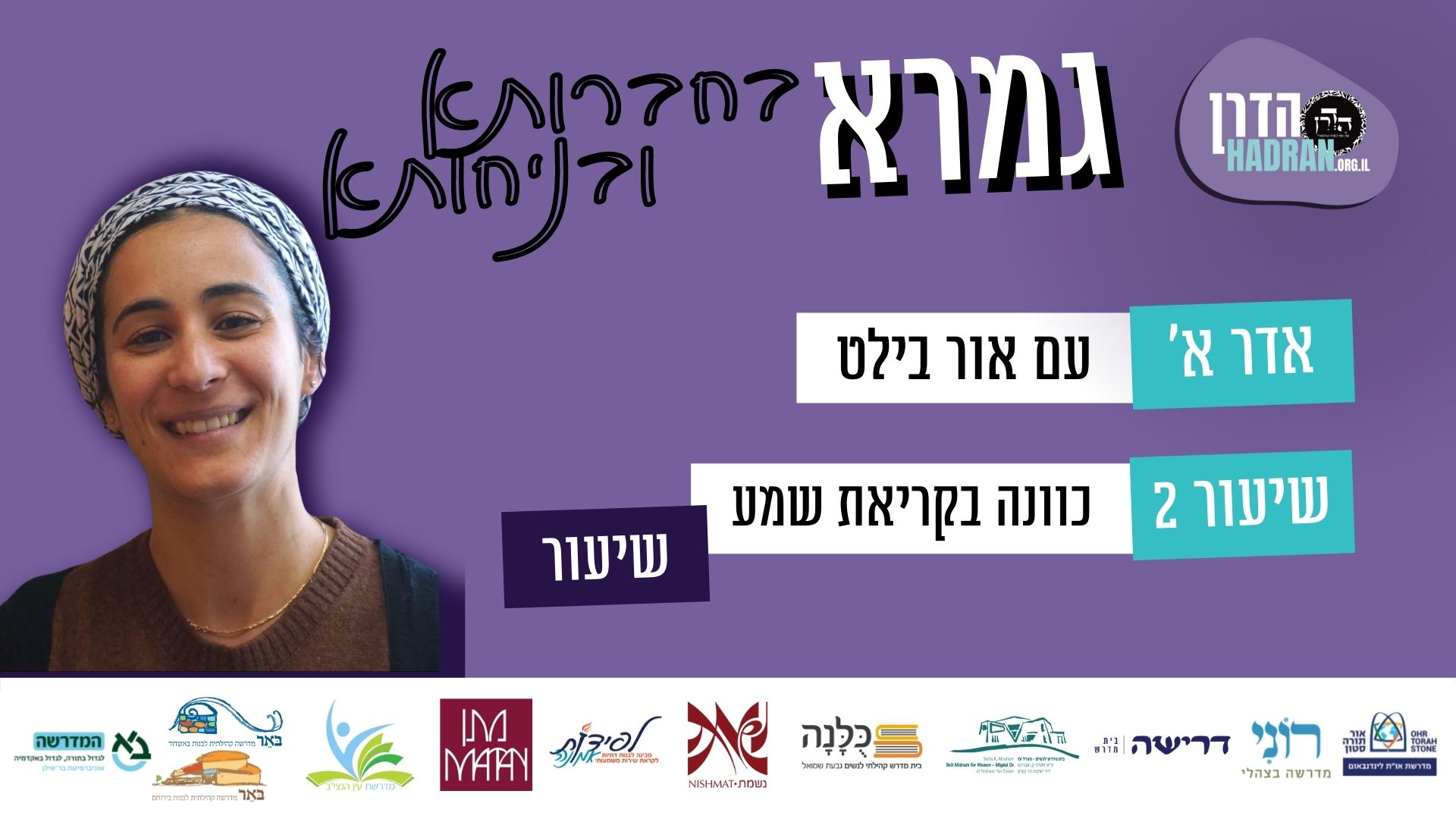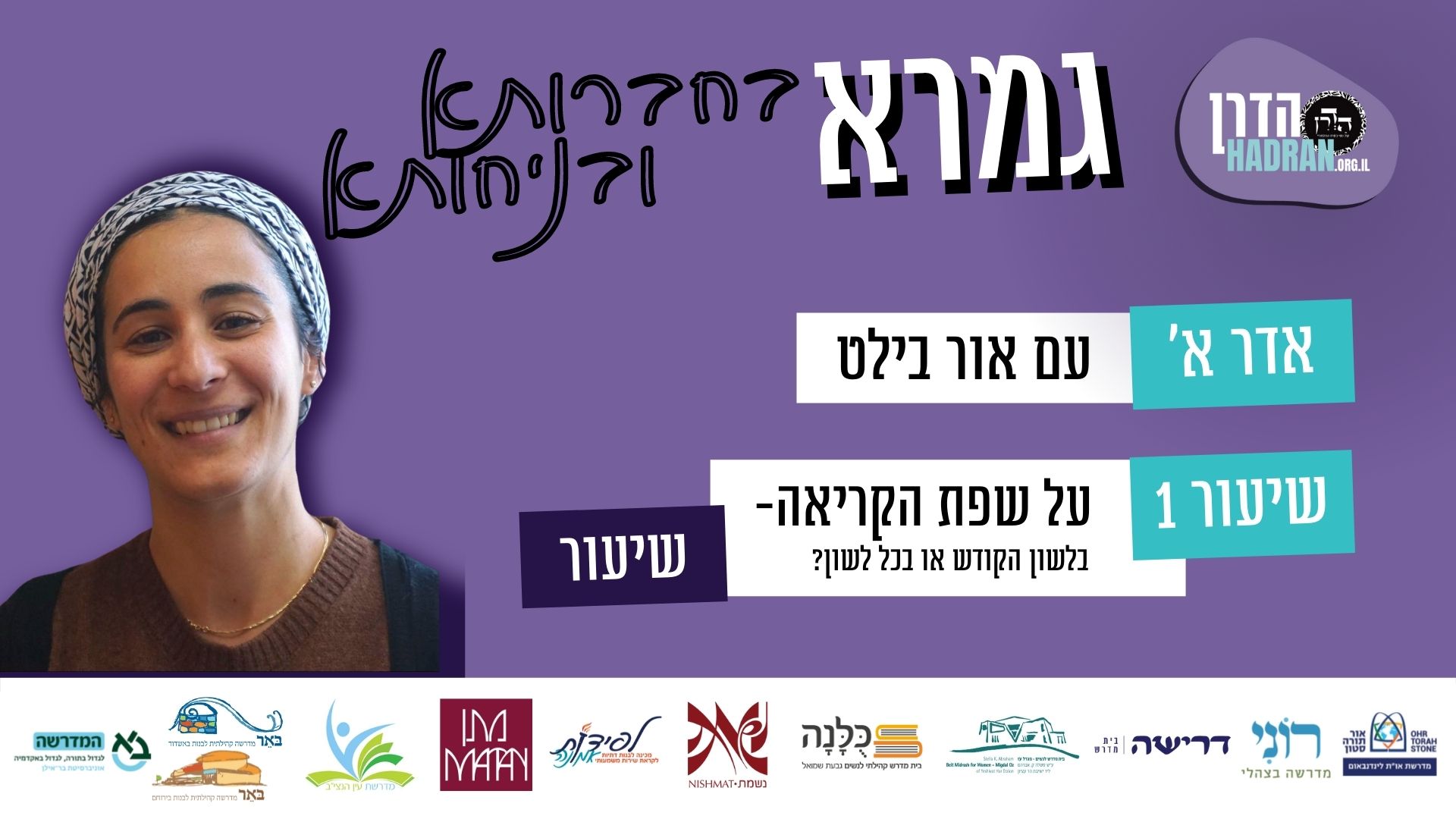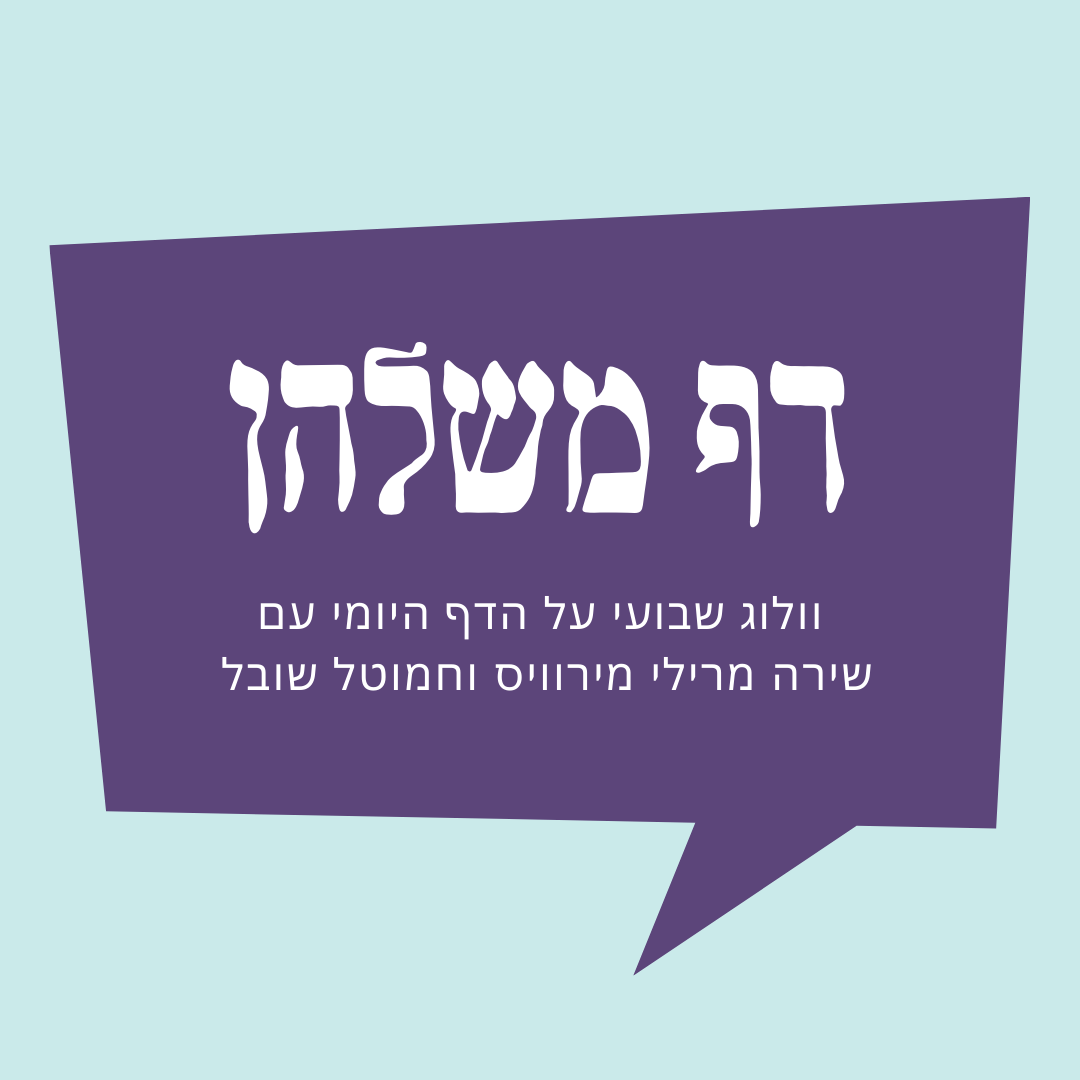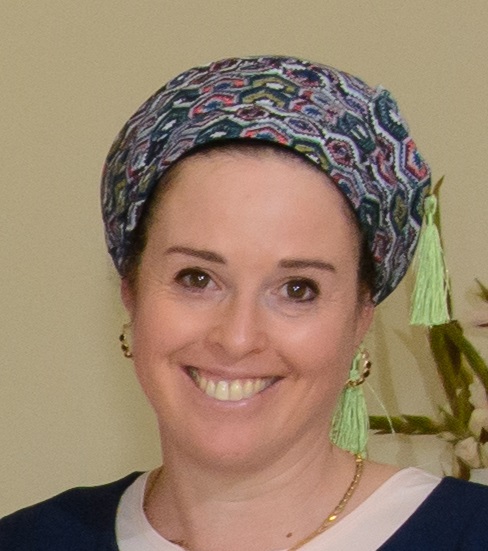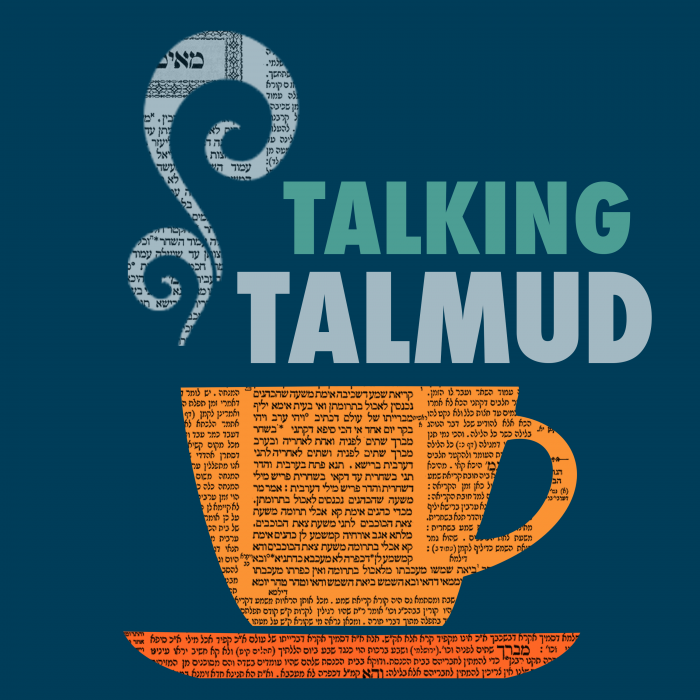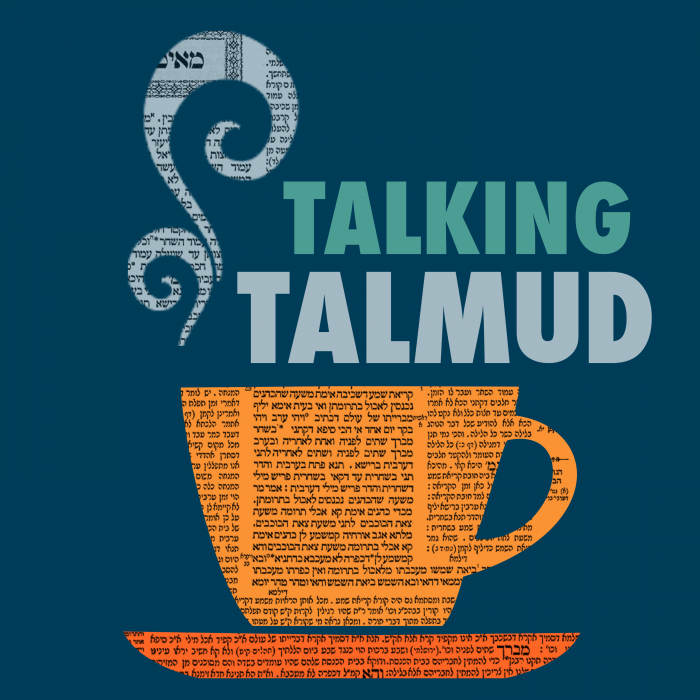מאיזה שעה עד איזה שעה אפשר להתפלל קריאת שמע? למה התחילה הגמרא כאילו באמצע נושא? למה התחילו בערבית? למה נתנו הסבר לזמן (משעה שהכהנים נכנסים לאכול בתרומתן) ולא ציינו את הזמן במפורש (צאת הכוכבים)? הגמרא מביאה כמה ברייתות שדנים באותה שאלה ומביאים תשובות אחרות. האם מקורות אלו סותרים את משנתינו או מתארים את אותו זמן אבל בדרך אחרת? מהן הדעות השונות שמובאות בברייתות לגבי זמן תחילת קריאת שמע?


כלים
הלימוד החודש מוקדש לרפואת פיליס הכט, גיטל פעשא בת מאשה רחל על ידי חברותיה הרבות שאוהבות ומעריכות אותה.
כלים
העמקה
רוצה להבין מה באמת קורה מתחת לפני השטח של הסוגיה?
שיעורים, פודקאסטים והרחבות של מיטב המורות שלנו יפתחו לך עוד זוויות וכיווני חשיבה.
חדשה בלימוד הגמרא?
זה הדף הראשון שלך? איזו התרגשות עצומה! יש לנו בדיוק את התכנים והכלים שיעזרו לך לעשות את הצעדים הראשונים ללמידה בקצב וברמה שלך, כך תוכלי להרגיש בנוח גם בתוך הסוגיות המורכבות ומאתגרות.
פסיפס הלומדות שלנו
גלי את קהילת הלומדות שלנו, מגוון נשים, רקעים וסיפורים. כולן חלק מתנועה ומסע מרגש ועוצמתי.
ברכות ב
מֵאֵימָתַי קוֹרִין אֶת שְׁמַע בָּעֲרָבִין? מִשָּׁעָה שֶׁהַכֹּהֲנִים נִכְנָסִים לֶאֱכוֹל בִּתְרוּמָתָן. עַד סוֹף הָאַשְׁמוּרָה הָרִאשׁוֹנָה. דִּבְרֵי רַבִּי אֱלִיעֶזֶר.
The beginning of tractate Berakhot, the first tractate in the first of the six orders of Mishna, opens with a discussion of the recitation of Shema, as the recitation of Shema encompasses an acceptance of the yoke of Heaven and of the mitzvot, and as such, forms the basis for all subsequent teachings. The Mishna opens with the laws regarding the appropriate time to recite Shema:
MISHNA: From when, that is, from what time, does one recite Shema in the evening? From the time when the priests enter to partake of their teruma. Until when does the time for the recitation of the evening Shema extend? Until the end of the first watch. The term used in the Torah (Deuteronomy 6:7) to indicate the time for the recitation of the evening Shema is beshokhbekha, when you lie down, which refers to the time in which individuals go to sleep. Therefore, the time for the recitation of Shema is the first portion of the night, when individuals typically prepare for sleep. That is the statement of Rabbi Eliezer.
וַחֲכָמִים אוֹמְרִים: עַד חֲצוֹת.
The Rabbis say: The time for the recitation of the evening Shema is until midnight.
רַבָּן גַּמְלִיאֵל אוֹמֵר עַד שֶׁיַּעֲלֶה עַמּוּד הַשַּׁחַר.
Rabban Gamliel says: One may recite Shema until dawn, indicating that beshokhbekha is to be understood as a reference to the entire time people sleep in their beds, the whole night.
מַעֲשֶׂה וּבָאוּ בָנָיו מִבֵּית הַמִּשְׁתֶּה, אָמְרוּ לוֹ: לֹא קָרִינוּ אֶת שְׁמַע, אָמַר לָהֶם: אִם לֹא עָלָה עַמּוּד הַשַּׁחַר חַיָּיבִין אַתֶּם לִקְרוֹת. וְלֹא זוֹ בִּלְבַד אָמְרוּ, אֶלָּא כָּל מַה שֶּׁאָמְרוּ חֲכָמִים ״עַד חֲצוֹת״, מִצְוָתָן עַד שֶׁיַּעֲלֶה עַמּוּד הַשַּׁחַר.
The mishna relates that Rabban Gamliel practiced in accordance with his ruling. There was an incident where Rabban Gamliel’s sons returned very late from a wedding hall. They said to him, as they had been preoccupied with celebrating with the groom and bride: We did not recite Shema. He said to them: If the dawn has not yet arrived, you are obligated to recite Shema. Since Rabban Gamliel’s opinion disagreed with that of the Rabbis, he explained to his sons that the Rabbis actually agree with him, and that it is not only with regard to the halakha of the recitation of Shema, but rather, wherever the Sages say until midnight, the mitzva may be performed until dawn.
הֶקְטֵר חֲלָבִים וְאֵבָרִים, מִצְוָתָן עַד שֶׁיַּעֲלֶה עַמּוּד הַשַּׁחַר וְכָל הַנֶּאֱכָלִים לְיוֹם אֶחָד, מִצְוָתָן עַד שֶׁיַּעֲלֶה עַמּוּד הַשַּׁחַר. אִם כֵּן, לָמָה אָמְרוּ חֲכָמִים ״עַד חֲצוֹת״ — כְּדֵי לְהַרְחִיק אָדָם מִן הָעֲבֵירָה:
Rabban Gamliel cites several cases in support of his claim, such as the burning of fats and limbs on the altar. Due to the quantity of offerings each day, the priests were often unable to complete the burning of all of the fats and limbs, so they continued to be burned into the night, as it is written: “This is the law of the burnt offering: The burnt offering shall remain upon the pyre on the altar all night until morning, while the fire on the altar burns it” (Leviticus 6:2). And, with regard to all sacrifices, such as the sin-offerings and the guilt-offerings that are eaten for one day and night; although the Sages state that they may be eaten only until midnight, by Torah law they may be eaten until dawn. This is in accordance with the verse: “On the day on which it is offered must you eat. Do not leave it until the morning” (Leviticus 7:15). If so, why did the Sages say that they may be eaten only until midnight? This is in order to distance a person from transgression, as if one believes that he has until dawn to perform the mitzva, he might be negligent and postpone it until the opportunity to perform the mitzva has passed.
גְּמָ׳ תַּנָּא הֵיכָא קָאֵי דְּקָתָנֵי ״מֵאֵימָתַי״?
GEMARA: The Mishna opens with the laws concerning the appropriate time to recite Shema with the question: From when does one recite Shema in the evening? With regard to this question, the Gemara asks: On the basis of what prior knowledge does the tanna of our mishna ask: From when? It would seem from his question that the obligation to recite Shema in the evening was already established, and that the tanna seeks only to clarify details that relate to it. But our mishna is the very first mishna in the Talmud.
וְתוּ: מַאי שְׁנָא דְּתָנֵי בְּעַרְבִית בְּרֵישָׁא? לִתְנֵי דְּשַׁחֲרִית בְּרֵישָׁא!
The Gemara asks: And furthermore, what distinguishes the evening Shema, that it was taught first? Let the tanna teach regarding the recitation of the morning Shema first. Since most mitzvot apply during the day, the tanna should discuss the morning Shema before discussing the evening Shema, just as the daily morning offering is discussed before the evening offering (Tosefot HaRosh).
תַּנָּא אַקְּרָא קָאֵי, דִּכְתִיב: ״בְּשָׁכְבְּךָ וּבְקוּמֶךָ״. וְהָכִי קָתָנֵי: זְמַן קְרִיאַת שְׁמַע דִּשְׁכִיבָה אֵימַת? — מִשָּׁעָה שֶׁהַכֹּהֲנִים נִכְנָסִין לֶאֱכוֹל בִּתְרוּמָתָן.
The Gemara offers a single response to both questions: The tanna bases himself on the verse as it is written: “You will talk of them when you sit in your home, and when you walk along the way, when you lie down, and when you arise” (Deuteronomy 6:7). By teaching the laws of the evening Shema first, the tanna has established that the teachings of the Oral Torah correspond to that which is taught in the Written Torah. And based on the Written Torah, the tanna teaches the oral law: When is the time for the recitation of Shema of lying down as commanded in the Torah? From when the priests enter to partake of their teruma. Just as the Written Torah begins with the evening Shema, so too must the Oral Torah.
וְאִי בָּעֵית אֵימָא: יָלֵיף מִבְּרִיָּיתוֹ שֶׁל עוֹלָם, דִּכְתִיב: ״וַיְהִי עֶרֶב וַיְהִי בֹקֶר יוֹם אֶחָד״.
However, there is another possible explanation for why the mishna opens with the evening Shema rather than with the morning Shema. If you wish, you could say instead that the tanna derives the precedence of the evening Shema from the order of the creation of the world. As it is written in the story of creation: “And there was evening, and there was morning, one day” (Genesis 1:5). According to this verse, day begins with the evening and not the morning. For both of these reasons it was appropriate to open the discussion of the laws of the recitation of Shema with the evening Shema.
אִי הָכִי, סֵיפָא דְּקָתָנֵי ״בַּשַּׁחַר מְבָרֵךְ שְׁתַּיִם לְפָנֶיהָ וְאַחַת לְאַחֲרֶיהָ, בָּעֶרֶב מְבָרֵךְ שְׁתַּיִם לְפָנֶיהָ וּשְׁתַּיִם לְאַחֲרֶיהָ״, לִתְנֵי דְּעַרְבִית בְּרֵישָׁא!
The Gemara asks: If so, why does the latter clause of the mishna, which appears later in the chapter, teach: In the morning one recites two blessings before Shema and one blessing afterward, and in the evening one recites two blessings before Shema and two afterward? Based upon the above reasoning, the mishna should have taught the blessing recited before and after the evening Shema first.
תַּנָּא פָּתַח בְּעַרְבִית, וַהֲדַר תָּנֵי בְּשַׁחֲרִית, עַד דְּקָאֵי בְּשַׁחֲרִית, פָּרֵישׁ מִילֵּי דְשַׁחֲרִית, וַהֲדַר פָּרֵישׁ מִילֵּי דְעַרְבִית.
The Gemara answers: Indeed, the tanna began by discussing the laws regarding the recitation of the evening Shema, and then taught the laws regarding the recitation of the morning Shema. Once he was already dealing with the morning Shema, he explained the matters of the morning Shema, and then explained the matters of the evening Shema.
אָמַר מָר מִשָּׁעָה שֶׁהַכֹּהֲנִים נִכְנָסִים לֶאֱכוֹל בִּתְרוּמָתָן. מִכְּדִי כֹּהֲנִים אֵימַת קָא אָכְלִי תְּרוּמָה? — מִשְּׁעַת צֵאת הַכּוֹכָבִים, לִתְנֵי: ״מִשְּׁעַת צֵאת הַכּוֹכָבִים״!
The Gemara proceeds to clarify the rest of the mishna. The Master said in the mishna that the beginning of the period when one recites Shema in the evening is when the priests enter to partake of their teruma. However, this does not specify a definitive time. When do the priests enter to partake of their teruma? From the time of the emergence of the stars. If that is the case, then let the tanna teach that the time for the recitation of the evening Shema is from the time of the emergence of the stars.
מִלְּתָא אַגַּב אוֹרְחֵיהּ קָמַשְׁמַע לַן — כֹּהֲנִים אֵימַת קָא אָכְלִי בִּתְרוּמָה — מִשְּׁעַת צֵאת הַכּוֹכָבִים. וְהָא קָמַשְׁמַע לַן דְּכַפָּרָה לָא מְעַכְּבָא. כִּדְתַנְיָא: ״וּבָא הַשֶּׁמֶשׁ וְטָהֵר״ — בִּיאַת שִׁמְשׁוֹ מְעַכַּבְתּוֹ מִלֶּאֱכוֹל בִּתְרוּמָה, וְאֵין כַּפָּרָתוֹ מְעַכַּבְתּוֹ מִלֶּאֱכוֹל בִּתְרוּמָה.
The Gemara responds: Indeed it would have been simpler to say that the time for the recitation of the evening Shema begins with the emergence of the stars, but the particular expression used by the tanna teaches us another matter in passing: When do priests partake of their teruma? From the time of the emergence of the stars. And the tanna teaches us a new halakha parenthetically: failure to bring an atonement offering does not prevent a priest from eating teruma. In cases where an impure priest is required to immerse himself in a ritual bath and bring an atonement offering, even if he already immersed himself, he is not completely ritually pure until he brings the atonement offering. Nevertheless, he is still permitted to partake of teruma. Taught in passing in our mishna, this is articulated fully in a baraita, based on a close reading of the biblical passages. As it was taught in a baraita with regard to the laws of ritual impurity, it is said: “One who touches it remains impure until evening. He should not eat of the consecrated items and he must wash his flesh with water. And the sun sets and it is purified. Afterwards, he may eat from the teruma, for it is his bread” (Leviticus 22:6–7). From the passage: “And the sun sets and it is purified,” that the absence of the setting of his sun prevents him from partaking of teruma, but failure to bring the atonement offering does not prevent him from partaking of teruma, may be inferred.
וּמִמַּאי דְּהַאי ״וּבָא הַשֶּׁמֶשׁ״ בִּיאַת הַשֶּׁמֶשׁ, וְהַאי ״וְטָהֵר״ — טְהַר יוֹמָא.
The Gemara discusses the proof offered in the baraita: From where do we know that the phrase: “And the sun sets” refers to the complete setting of the sun, and therefore, “and it is purified” refers to the fact that the day is pure, i.e., and the sun sets and it is purified is one phrase meaning that the sun will set, the air will clear, and the stars will emerge (Rav Hai Gaon)?
דִּילְמָא בִּיאַת אוֹרוֹ הוּא, וּמַאי ״וְטָהֵר״ — טְהַר גַּבְרָא?!
Perhaps the expression: “And the sun sets and it is purified” refers to the very beginning of sunset, the setting of the sun’s light. According to that explanation, what does the expression and it is purified mean? It means that the person will become purified. After immersing, he will wait until the beginning of sunset, and only then will he be able to eat of his teruma (Tosafot).
אָמַר רַבָּהּ בַּר רַב שֵׁילָא: אִם כֵּן, לֵימָא קְרָא: ״וְיִטְהָר״, מַאי ״וְטָהֵר״ — טְהַר יוֹמָא, כִּדְאָמְרִי אִינָשֵׁי: ״אִיעֲרַב שִׁמְשָׁא וְאִדַּכִּי יוֹמָא״.
Rabba bar Rav Sheila said: If so, that: And it is purified, means that the priest goes and purifies himself, then let the verse say unambiguously: And he will become purified. Since the Torah does not employ that language, the conclusion is: What is the meaning of the expression: And it is purified? It means the day is pure, no residue of day remains, as people say colloquially: The sun has set and the day is purified.
בְּמַעֲרָבָא, הָא דְּרַבָּהּ בַּר רַב שֵׁילָא לָא שְׁמִיעַ לְהוּ, וּבְעוֹ לַהּ מִיבַּעְיָא: הַאי ״וּבָא הַשֶּׁמֶשׁ״ בִּיאַת שִׁמְשׁוֹ הוּא, וּמַאי ״וְטָהֵר״ — טְהַר יוֹמָא, אוֹ דִילְמָא בִּיאַת אוֹרוֹ הוּא, וּמַאי ״וְטָהֵר״ — טְהַר גַּבְרָא.
In the West, Eretz Yisrael, they did not hear this explanation given by Rabba bar Rav Sheila. They raised the dilemma: Does the expression: And the sun sets, refer to the actual setting of the sun, and does: And it is purified, mean the day clears away? Or perhaps it refers to the setting of its light at sunset, in which case what is the meaning of: And it is purified? It refers to the purification of the person. In other words, in Eretz Yisrael, they attempted to clarify the halakha based on the biblical passage, but were unable to do so.
וַהֲדַר פָּשְׁטוּ לַהּ מִבָּרַיְיתָא. מִדְּקָתָנֵי בְּבָרַיְיתָא, סִימָן לַדָּבָר — צֵאת הַכּוֹכָבִים. שְׁמַע מִינַּהּ — בִּיאַת שִׁמְשׁוֹ הוּא, וּמַאי ״וְטָהֵר״ — טְהַר יוֹמָא.
Ultimately they resolved this dilemma from a baraita. It was taught in a baraita that the time for the recitation of the evening Shema corresponds to the time when priests are permitted to eat of their teruma, a sign for which is the emergence of the stars. Therefore, derive from here that “and the sun sets” refers to the complete sunset, and the expression “and it is purified” means the day clears away, as the Sages in Babylonia concluded.
אָמַר מָר מִשָּׁעָה שֶׁהַכֹּהֲנִים נִכְנָסִין לֶאֱכוֹל בִּתְרוּמָתָן. וּרְמִינְהוּ: מֵאֵימָתַי קוֹרִין אֶת שְׁמַע בָּעֲרָבִין — מִשֶּׁהֶעָנִי נִכְנָס לֶאֱכוֹל פִּתּוֹ בְּמֶלַח, עַד שָׁעָה שֶׁעוֹמֵד לִיפָּטֵר מִתּוֹךְ סְעוּדָּתוֹ.
In our mishna, the Master said: The beginning of the time for the recitation of the evening Shema is: From the time when the priests enter to partake of their teruma. The Gemara raises a contradiction to this opinion from a baraita that states that the time for the recitation of the evening Shema is: From when a poor person enters to eat his bread with salt until he rises from his meal.
סֵיפָא, וַדַּאי פְּלִיגָא אַמַּתְנִיתִין. רֵישָׁא, מִי לֵימָא פְּלִיגִי אַמַּתְנִיתִין?
The Gemara begins its analysis by clarifying whether there is an actual contradiction here, or whether different expressions are being employed to describe the same time. The latter clause of the baraita, which established that the time for the recitation of the evening Shema ends when a poor person rises from his meal, certainly disagrees with our mishna. Since the poor person clearly does not continue eating until the end of the first watch, this baraita certainly contradicts our mishna. With regard to the first clause of the baraita, however, which establishes the beginning of the time for the recitation of the evening Shema, shall we say that it disagrees with our mishna?
לָא, עָנִי וְכֹהֵן חַד שִׁיעוּרָא הוּא.
The Gemara immediately rejects this idea: No, the time when the poor person eats and the time when the priest is purified and permitted to partake of his teruma are one and the same time.
וּרְמִינְהוּ: מֵאֵימָתַי מַתְחִילִין לִקְרוֹת קְרִיאַת שְׁמַע בְּעַרְבִית — מִשָּׁעָה שֶׁבְּנֵי אָדָם נִכְנָסִין לֶאֱכוֹל פִּתָּן בְּעַרְבֵי שַׁבָּתוֹת, דִּבְרֵי רַבִּי מֵאִיר. וַחֲכָמִים אוֹמְרִים: מִשָּׁעָה שֶׁהַכֹּהֲנִים זַכָּאִין לֶאֱכוֹל בִּתְרוּמָתָן. סִימָן לַדָּבָר: צֵאת הַכּוֹכָבִים. וְאַף עַל פִּי שֶׁאֵין רְאָיָה לַדָּבָר, זֵכֶר לַדָּבָר, שֶׁנֶּאֱמַר: ״וַאֲנַחְנוּ עֹשִׂים בַּמְּלָאכָה וְחֶצְיָם מַחֲזִיקִים בָּרְמָחִים מֵעֲלוֹת הַשַּׁחַר עַד צֵאת הַכּוֹכָבִים״, וְאוֹמֵר: ״וְהָיוּ לָנוּ הַלַּיְלָה מִשְׁמָר וְהַיּוֹם מְלָאכָה״.
The Gemara raises a contradiction from the Tosefta: From when does one begin to recite Shema in the evening? From the time when people enter to eat their bread on Shabbat eve. This is the statement of Rabbi Meir. As they do in our mishna, the Rabbis say: From the time when the priests are eligible to partake of their teruma, a sign for which is the emergence of the stars. And although there is no explicit proof that the emergence of the stars is when one may begin to recite the evening Shema, there is an allusion in the book of Nehemiah to the fact that the emergence of the stars is generally considered the beginning of the night. As it is stated with regard to the building of the walls of Jerusalem: “And we perform the work, and half of them grasp their spears from dawn until the emergence of the stars” (Nehemiah 4:15). And it says: “That in the night they may be a guard to us, and may labor in the day” (Nehemiah 4:16). From here we ascertain that the day ends with the emergence of the stars.
מַאי ״וְאוֹמֵר״?
Even before analyzing these sources, the Gemara seeks to clarify a confusing element in the Tosefta. In their biblical proof, the Rabbis do not suffice with one verse, but rather they say: And it says…and they cite an additional verse. What is added by this use of: And it says? It seems superfluous, as the entire proof appears in the first verse.
וְכִי תֵּימָא מִכִּי עָרְבָא שִׁמְשָׁא, לֵילְיָא הוּא, וְאִינְהוּ דְּמַחְשְׁכִי וּמַקְדְּמִי, תָּא שְׁמַע ״וְהָיוּ לָנוּ הַלַּיְלָה מִשְׁמָר וְהַיּוֹם מְלָאכָה״.
The Gemara answers that the first verse was not sufficient. As, if you say that night begins when the sun sets, but the workers stayed late and arrived early; i.e., due to the importance of their task they worked even into the night. In anticipation of this objection, the second verse was cited to teach: Come and hear, as it is stated: “That in the night they may be a guard to us, and may labor in the day,” the time between dawn and the emergence of the stars is explicitly referred to as “day,” proving that night begins with the emergence of the stars.
קָא סָלְקָא דַּעְתָּךְ דְּעָנִי וּבְנֵי אָדָם חַד שִׁעוּרָא הוּא. וְאִי אָמְרַתְּ עָנִי וְכֹהֵן חַד שִׁעוּרָא הוּא, חֲכָמִים הַיְינוּ רַבִּי מֵאִיר?
In analyzing the three opinions regarding the beginning of the period for the recitation of the evening Shema, the Gemara begins with the supposition: It might enter your mind to say that the time when the poor person typically eats his meal and the time when ordinary people eat their Shabbat evening meal are one and the same time, since in both cases those eating would seek to begin their meals as early as possible, as, for different reasons, they are unable to kindle additional lights to illuminate their meal. And, if you say that the time of the poor person’s meal and the time when the priest is purified and permitted to partake of his teruma are one and the same time, then the opinion of the Rabbis is identical to that of Rabbi Meir. What is their disagreement?
אֶלָּא, שְׁמַע מִינַּהּ עָנִי שִׁעוּרָא לְחוּד וְכֹהֵן שִׁעוּרָא לְחוּד. לָא, עָנִי וְכֹהֵן חַד שִׁעוּרָא הוּא, וְעָנִי וּבְנֵי אָדָם לָאו חַד שִׁעוּרָא הוּא.
Rather, what we said previously must be rejected, and instead learn from this that there is a separate time for the poor person and a separate time for the priest. However, this conclusion is based on the assumption that the time of the poor person and the time of people are the same. That too can be rejected with the assertion that, no, the time of the poor person and the priest are one and the same time, and the time of the poor person and people are not the same. Accordingly, the opinion expressed by the tanna in our baraita is identical to that of the other tanna’im, and only Rabbi Meir disagrees with them.
וְעָנִי וְכֹהֵן חַד שִׁעוּרָא הוּא? וּרְמִינְהוּ: מֵאֵימָתַי מַתְחִילִין לִקְרוֹת שְׁמַע בָּעֲרָבִין — מִשָּׁעָה שֶׁקָּדַשׁ הַיּוֹם בְּעַרְבֵי שַׁבָּתוֹת, דִּבְרֵי רַבִּי אֱלִיעֶזֶר. רַבִּי יְהוֹשֻׁעַ אוֹמֵר: מִשָּׁעָה שֶׁהַכֹּהֲנִים מְטוֹהָרִים לֶאֱכוֹל בִּתְרוּמָתָן. רַבִּי מֵאִיר אוֹמֵר, מִשָּׁעָה שֶׁהַכֹּהֲנִים טוֹבְלִין לֶאֱכוֹל בִּתְרוּמָתָן. אָמַר לוֹ רַבִּי יְהוּדָה: וַהֲלֹא כֹּהֲנִים מִבְּעוֹד יוֹם הֵם טוֹבְלִים? רַבִּי חֲנִינָא אוֹמֵר מִשָּׁעָה שֶׁעָנִי נִכְנָס לֶאֱכוֹל פִּתּוֹ בְּמֶלַח. רַבִּי אַחַאי וְאָמְרִי לַהּ רַבִּי אַחָא אוֹמֵר: מִשָּׁעָה שֶׁרוֹב בְּנֵי אָדָם נִכְנָסִין לְהָסֵב.
And is the time of the poor person and the priest the same? The Gemara raises a contradiction to this approach from another baraita, in which other opinions regarding the time for the recitation of the evening Shema are cited: From when does one begin to recite the evening Shema?
From the time when the day becomes sanctified on the eve of Shabbat, this is the statement of Rabbi Eliezer, who established an earlier time for Shema.
Rabbi Yehoshua, like our mishna, says: From the time when the priests are eligible to partake of their teruma.
Rabbi Meir says: The time for the recitation of Shema begins before the priests were purified, from when the priests immerse themselves in order to partake of their teruma.
Rabbi Yehuda said to Rabbi Meir: How is it possible that the time for the recitation of the evening Shema corresponds to the time of the priests’ immersion? Do the priests not immerse themselves during the day, so that with nightfall and the onset of a new day they will be purified? If so, how can that time be called night?
Rabbi Ḥanina says that the time for the recitation of the evening Shema begins when the poor person enters to eat his bread with salt.
But Rabbi Aḥai, and some say Rabbi Aḥa, says: From the time when most people enter to recline at their meal during the week.
וְאִי אָמְרַתְּ עָנִי וְכֹהֵן חַד שִׁעוּרָא הוּא, רַבִּי חֲנִינָא הַיְינוּ רַבִּי יְהוֹשֻׁעַ!
The preceding was the text of the baraita. Returning to our question, if you say that the time of the poor person and the priest are one and the same time, then the opinion of Rabbi Ḥanina is identical to that of Rabbi Yehoshua. However, the fact that they are cited together indicates that they are not, in fact, the same.
אֶלָּא לָאו שְׁמַע מִינַּהּ שִׁעוּרָא דְּעָנִי לְחוּד וְשִׁעוּרָא דְּכֹהֵן לְחוּד, שְׁמַע מִינַּהּ.
Rather, must one not conclude from this the time for the poor person is separate and the time for the priest is separate? Since no objection is raised, the Gemara concedes: Indeed, conclude from this.
הֵי מִינַּיְיהוּ מְאוּחָר? מִסְתַּבְּרָא דְּעָנִי מְאוּחָר דְּאִי אָמְרַתְּ דְּעָנִי מוּקְדָּם רַבִּי חֲנִינָא הַיְינוּ רַבִּי אֱלִיעֶזֶר. אֶלָּא לָאו שְׁמַע מִינַּהּ דְּעָנִי מְאוּחָר. שְׁמַע מִינַּהּ.
Having established that the time of the poor person and that of the priest are different, the Gemara seeks to determine: which one is later? The Gemara suggests that it is reasonable to conclude that the time of the poor person is later. As if you say that the poor person is earlier, it would be impossible to establish a time earlier than that established by Rabbi Yehoshua, unless we hold that night begins with sunset, in which case the opinion of Rabbi Ḥanina is identical to that of Rabbi Eliezer. Rather, must one not conclude from this that the poor person is later? The Gemara notes: Indeed, conclude from this.
אָמַר מָר. אֲמַר לֵיהּ רַבִּי יְהוּדָה: וַהֲלֹא כֹּהֲנִים מִבְּעוֹד יוֹם הֵם טוֹבְלִים!
We learned that the Master said in a baraita that the time for the recitation of the evening Shema according to Rabbi Meir begins with the time of the immersion of the priests. Regarding this, Rabbi Yehuda said to Rabbi Meir: Do the priests not immerse themselves during the day?
שַׁפִּיר קָאָמַר לֵיהּ רַבִּי יְהוּדָה לְרַבִּי מֵאִיר?
The Gemara notes: What Rabbi Yehuda said to Rabbi Meir seems correct, and how can Rabbi Meir respond? Rabbi Meir’s response is connected to the fundamental dispute over when night begins. After sunset, a period begins which is neither day nor night. The tanna’im disagree over the precise duration of this period known as twilight [bein hashemashot]. Rabbi Yehuda holds that twilight extends a full hour after sunset. Rabbi Neḥemya agrees in principle, though he disagrees over the specifics. Rabbi Yosei maintains that twilight is very brief, and occurs immediately before the emergence of the stars, which marks the beginning of the night. Regarding Rabbi Meir’s argument, Rabbi Yehuda asks that since the priests immerse themselves before twilight, they have a long wait until nightfall; clearly their immersion takes place while it is still day.
וְרַבִּי מֵאִיר הָכִי קָאָמַר לֵיהּ: מִי סָבְרַתְּ דַּאֲנָא אַבֵּין הַשְּׁמָשׁוֹת דִּידָךְ קָא אָמֵינָא? אֲנָא אַבֵּין הַשְּׁמָשׁוֹת דְּרַבִּי יוֹסֵי קָא אָמֵינָא, דְּאָמַר רַבִּי יוֹסֵי בֵּין הַשְּׁמָשׁוֹת כְּהֶרֶף עַיִן, זֶה — נִכְנָס, וְזֶה — יוֹצֵא, וְאִי אֶפְשָׁר לַעֲמוֹד עָלָיו.
The Gemara answers that Rabbi Meir said to Rabbi Yehuda as follows: Do you maintain that I am speaking of your definition of twilight? I am speaking of Rabbi Yosei’s definition of twilight, as Rabbi Yosei said: Twilight is like the blink of an eye; night begins and day ends and the time between them is so brief, it is impossible to quantify. According to this opinion, the priests immerse themselves just before the emergence of the stars, when it is already considered night.

